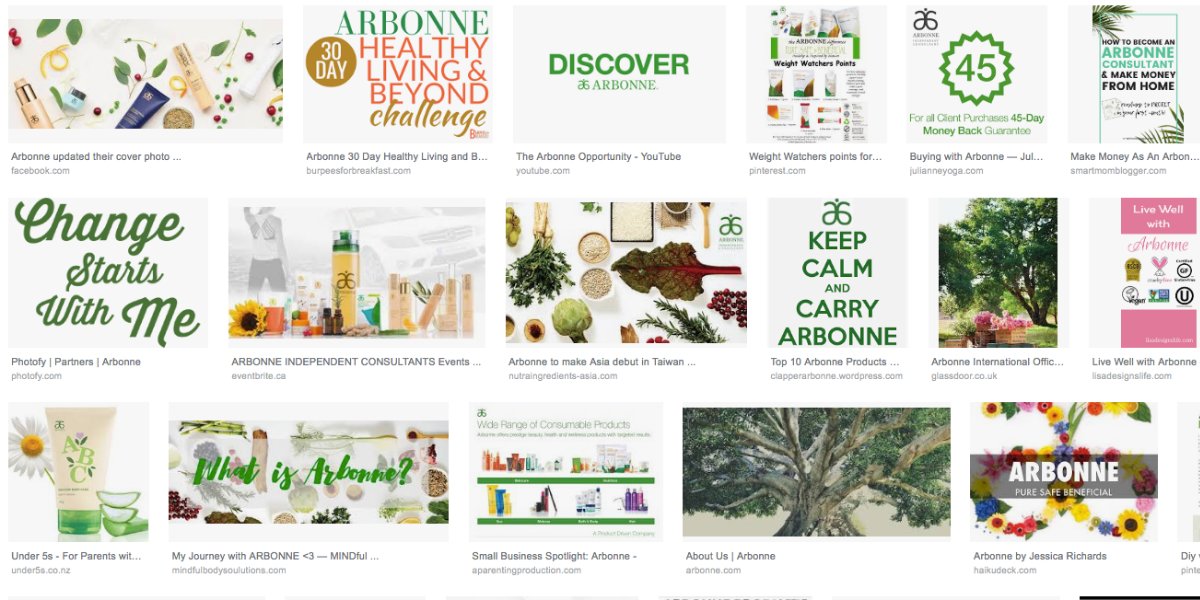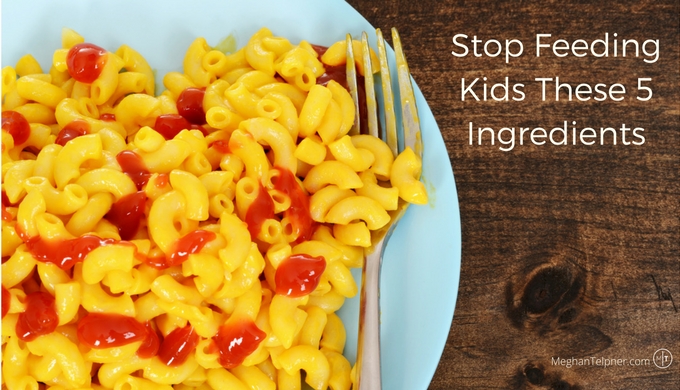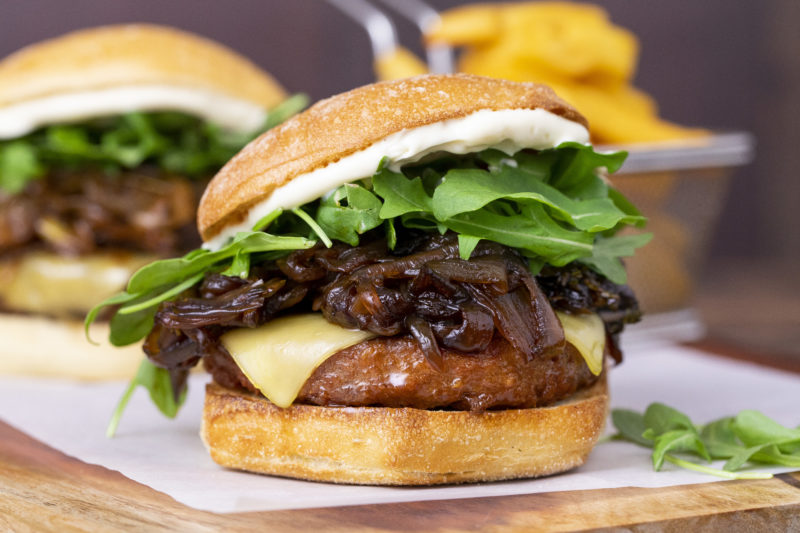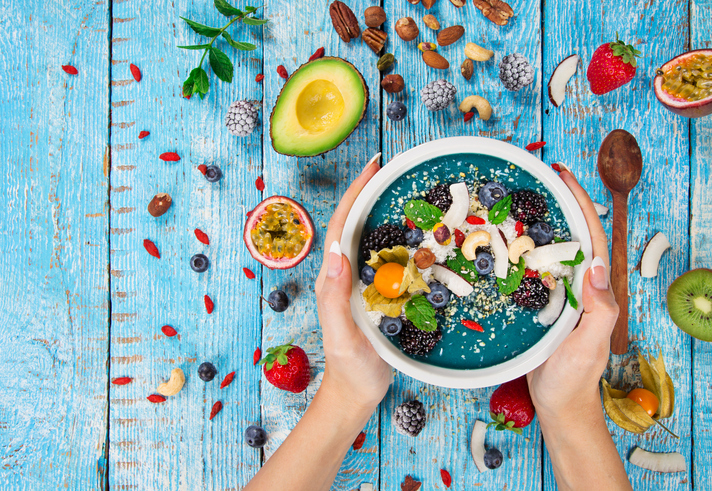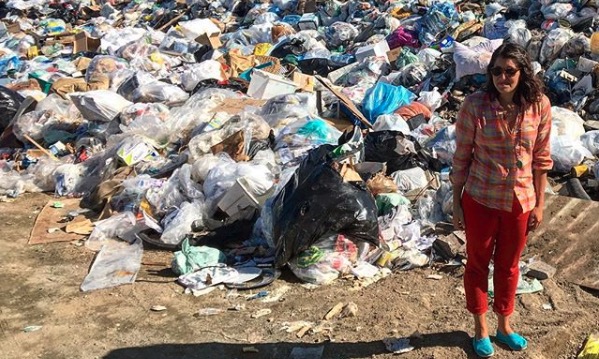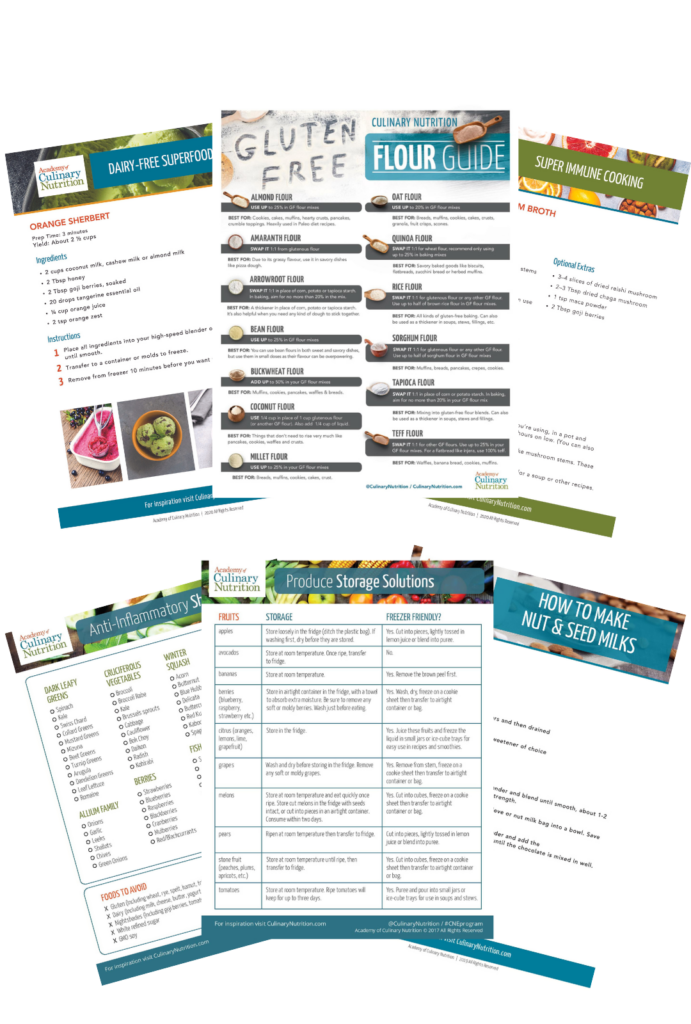How To Have A Conversation About GMOs
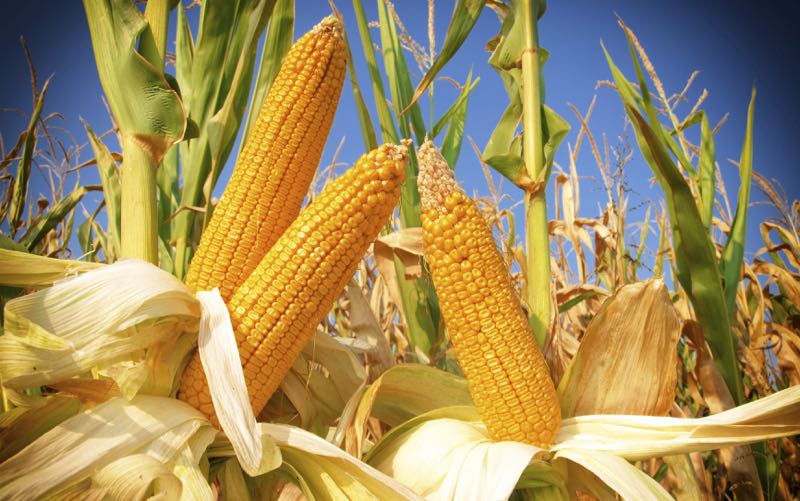
Most people who have an opinion on genetically modified organisms (GMOs) in our food will either be all in or dead set against the idea of having them, unidentified and unlabelled, in our food supply. From where I stand, awareness is our biggest ally and awareness about genetically modified foods is currently in the 70% range. That’s huge.
Recently a law was passed in the state of Vermont requiring GMOs to be labelled on all food packaging. This gives national corporations the option to create custom packaging for one state, update all packaging, or stop selling there. Additionally, companies like Campbell’s, Mars and General Mills have electively opted for GMO labelling of their products in the US, but not in Canada (not yet, at least).
Though I still wouldn’t recommend buying from these brands for other health concerns, at least in the US, the GMO factor is one less thing to worry about.
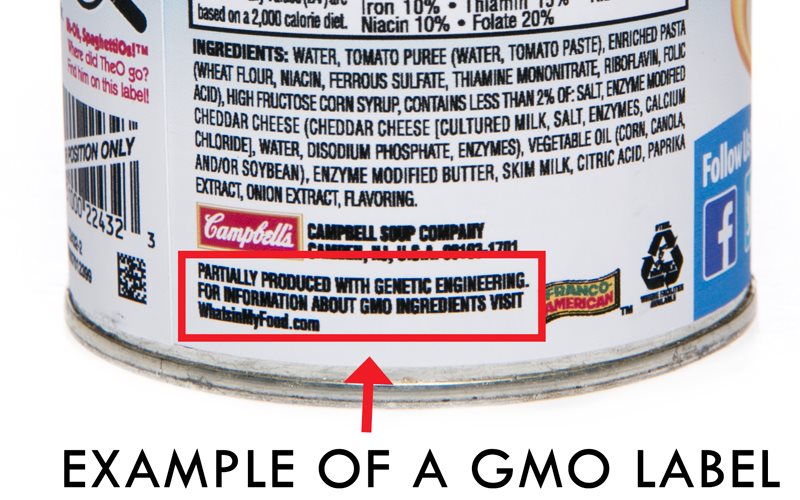
Source
The way it stands at the time of writing this, as long as genetically modified foods are approved by the government they do not need to be labelled.
Currently, genetically modified crops are banned in 38 countries globally. This includes Algeria, Turkey, Saudi Arabia, Belize. Peru, Ecuador, Venezuela, Scotland, Wales, Northern Ireland, Germany, France, The Netherlands, Greece, Russia, Bulgaria, Serbia, Croatia, Italy, Denmark, Hungary, Austria, Poland, Slovenia, Luxembourg, Norway and Switzerland. You can view the full list here.
Conveniently, leading up to and following this year’s global “March Against Monsanto“, which saw gatherings take place on the same day in 600 cities around the world, an influx of pro-GMO stories hit the media. This followed a timely report released a few days before that march. The report was 366 pages long and the overall conclusion about GMOs is decidedly neutral, even with the estimate that somewhere between $1 million and $5 million dollars from Dow Chemical, DuPont and Monsanto was donated to the National Academy of Sciences in 2014.
The overall conclusion of the report: “More research is needed”.
This doesn’t satisfy those of us who want guaranteed proof of long term safety of the chemicals used in our food, or the groups that want a conclusive statement that genetically engineered crops and the foods that result from them are better. In fact, most of the paper was about animal feed. The biggest and most glaring issue, of course, is that if more research is needed, why have these been allowed to enter our food supply so rapidly?
GMO producers and those that serve to profit off the widespread use have promised farmers many things, including higher yields, less pesticides and that they are completely safe for human consumption. So far, none of these have been proven to be true. The purpose for this post is to help you gain clarity around the issue, the conflict and hopefully allow you to have an open and informed conversation around the facts concerning the global concern of genetically engineering our food supply.
What foods are genetically modified?
The key crops that are genetically engineered include:
- Corn (includes corn byproducts used in processed food, vitamin supplements, sweeteners, etc.)
- Soybeans
- Cotton (includes cottonseed oil, and cotton used in clothing, diapers and tampons)
- Canola
- Sugar beets (often labelled as “sugar” on ingredient labels)
- Alfalfa
- Papaya
- Yellow “crook neck” squash
New to the party and recently approved in Canada is genetically modified salmon that features eel genes. This will be unlabelled and sold in supermarkets as – wait for it – ‘salmon’.
Let’s Get The GMO Conversation Started
I know that most of you who read my blog understand that our goal is to consume less chemicals. I also appreciate that to have a conversation about GMOs, especially with those that have strong differing opinions, can be challenging. The key here is to recognize that it is not your job to change anyone’s mind, but that education goes a long way. I have put together some of the most common arguments that support the use of genetically modified foods and have provided, to the best of my ability, the facts around those claims.
Claim: People globally are starving, and we need GMOs to feed the world.

This is one of the oldest arguments there is in favour of GMOs, but do you see the irony? It’s one of the oldest arguments and yet people are still starving around the world. It takes about three months to grow a crop of corn. GMOs were first introduced into the food supply 25 years ago, so why are there still people starving?
There are several issues here, but the most obvious is that, today, in 2016, we currently grow enough food to feed the world. For the past two decades the rate of global food production has increased faster than the rate of global population growth. The world already produces more than 1 ½ times enough food to feed everyone on the planet. The challenge is that the small plot farmers, earning less than $2 a day, can’t afford to buy the food.
The world already produces more than 1 ½ times enough food to feed everyone on the planet.
The real cause of hunger isn’t scarcity of food but poverty and inequality. If poverty is the issue, how is selling poor farmers seeds that cannot be saved year after year and require heavy chemical use getting to the root of the issue? Plain and simple, it’s not.
Monsanto, Dow and the other publicly traded chemical corporations are not aid agencies. They are corporations and their goal is to make more money year over year.
The GMO crops currently being grown largely go to feed the massive amounts of animals we eat, get processed into our cheap ‘vegetable oil’ and get turned into the bulk of our processed diets. They are primarily industrial crops, none of which are for direct human consumption, let alone feeding the hungry.
As it is written on Monsanto.com
“Monsanto patents many of the seed varieties we develop. Patents are necessary to ensure that we are paid for our products and for all the investments we put into developing these products… When farmers purchase a patented seed variety, they sign an agreement that they will not save and replant seeds produced from the seed they buy from us.”
If we want to look at feeding the world with GMOs, shouldn’t we start by looking at developing crops that are focussed on nutrient density rather than breeding in traits for herbicide tolerance? And wouldn’t it make more sense to feed the world with seeds that farmers have been saving for their own use over years and generations? Doesn’t that enable the growth of plants without relying on the purchase of new seeds, pesticides and licenses every year?
This also means that if a GMO seed blows in the wind onto a non-GMO farm, Monsanto can (and does!) seek out compensation from farmers, irregardless of the size of their farms or their growing intentions.
The question then becomes whether we are looking to ‘feed the world’ or whether we want to actually reduce hunger. Feeding the world has nothing to do with reducing hunger or ending poverty. Feeding the world with genetically engineered crops will not end world hunger. Simply put, people are hungry because they are poor in the economic sense and as such, lack the resources to be self-sustaining. As with most industries, creating a structure based on reliance on GMOs further enables the few to extract much from the many in need.
Creating a structure based on reliance on GMOs further enables the few to extract much from the many in need.
Claim: We are dealing with global droughts. GMO’s help people grow food in a changing climate.
Climate change is a global issue and it is affecting every corner of the planet in different ways. What we’re all seeing is more extreme weather patterns and this affects both your favourite farmer at your local market and the farmer in Mozambique growing food for his family on his small plot farm. And so Monsanto proposes drought resistant crops as a solution.
The small problem here is that for the small crop farmers in Mozambique, India, Bali and beyond this is not a sustainable solution. They may be able to save up to buy seeds for one year, but what about two years down the line when the same fields are yielding less and requiring more chemicals (I’ll come back to this one). This, as I said, is the small problem.
The solutions to climate change have to happen at the government level and locally in order to be immediate and sustainable. Will GMO ever serve to feed the hungry and do so in a more sustainable way, making seeds tolerant to dry soil and other such challenging growing conditions? Perhaps one day. But they haven’t done so yet.
The bigger issue is that these GMO seeds, which require heavier pesticide load, are part of the climate change issue. The chemicals from these farms run off into our lakes and rivers, which then run into our oceans creating massive dead zones. Dead zones are where a surge of plankton raise the temperature of the water, affecting the oceans globally and seaside communities on a local level. These chemicals contribute to acid rain and affect the health and longevity of our soil. In short, currently farming of genetically modified crops are part of the problem, not the solution.
Claim: With pesticides bred right into the seeds, farmers can spray less herbicides and pesticides on their crops.
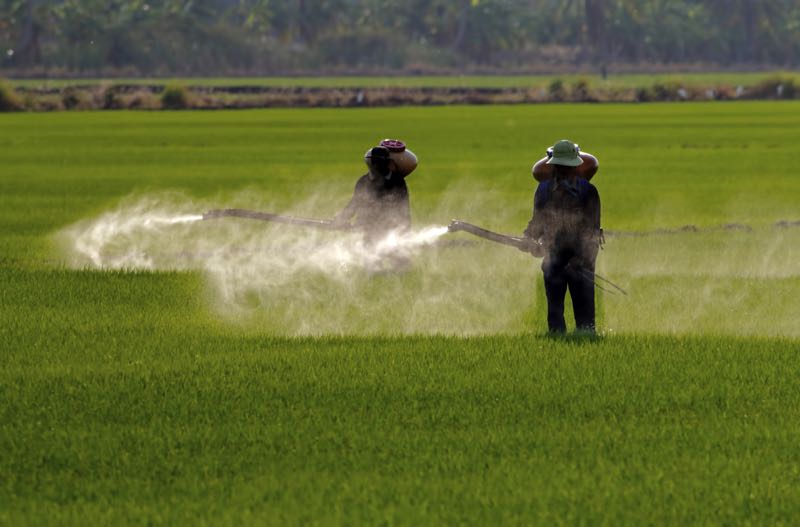
If only this plan had panned out. Studies are showing that, in fact, the opposite is true as nature is responding to these chemicals with super weeds and super pests. Crops are being genetically engineered as “Roundup Ready”, which means they can withstand massive spraying with the Monsanto herbicide Roundup. Now super weeds and super bugs are becoming Roundup resistant, so higher volumes of stronger pesticides are being used.
There are two main traits being engineered in the GM crops:
- Herbicide tolerant: Enables farmers to spray chemicals directly on the crop without killing it. These are commonly referred to as Roundup Ready (meaning they can tolerate higher amounts of the Monsanto herbicide Roundup)
- Pesticide-producing crops: Where the plant produces its own internal pesticide, supposedly requiring less spray by farmers. These plants are bred with the bacteria bacillus thuringiensis, commonly referred to as Bt toxin and you may read about foods that are “Bt engineered”.
Over 99% of GMO acreage is engineered by chemical companies to tolerate heavy herbicide (glyphosate) use and/or produce insecticide (Bt) in every cell of every plant over the entire growing season.
This study by Charles Benbrook of Washington State University found that GMO usage on farms drove up herbicide use by 527 million pounds, or about 11%, between 1996 and 2011. Between 1996 and 1999 herbicide use did drop, but then mother nature did what it always does and outsmarted man. This is when weeds and pests developed resistance to Roundup, pushing farmers to apply more herbicides per acre. In 2002, farmers using Roundup Ready soybeans increased Roundup application rates by 21%, triggering a 19 million pound overall increase in Roundup use.
Benbrook concluded the following:
Contrary to often-repeated claims that today’s genetically-engineered crops have, and are reducing pesticide use, the spread of glyphosate-resistant weeds in herbicide-resistant weed management systems has brought about substantial increases in the number and volume of herbicides applied. If new genetically engineered forms of corn and soybeans tolerant of 2,4-D are approved, the volume of 2,4-D sprayed could drive herbicide usage upward by another approximate 50%. The magnitude of increases in herbicide use on herbicide-resistant hectares has dwarfed the reduction in insecticide use on Bt crops over the past 16 years, and will continue to do so for the foreseeable future.
Ramon J. Seidler, Ph.D., a former Senior Scientist at the Environmental Protection Agency Office of Research and Development, Western Ecology Division in Corvallis Oregon wrote a lengthy report in 2014 drawing a very similar conclusion. The report includes the disturbing fact that the people who now own and control a large portion of our food supply are the chemical companies that historically have produced DDT, PCBs, bovine growth hormone, Agent Orange, glyphosate products and, more recently, neonicotinoids.
What interest would these companies have in reducing the chemicals needed for growing food?
Claim: Genetically modified crops have higher yields than conventional crops or organics
According to the Biotechnology Innovation Organization, “genetically modified (GM) crops are a boon to humanity because they allow farmers to “generate higher crop yields with fewer inputs”. If only this were true.
In a paper funded by the US Department of Agriculture, University of Wisconsin researchers have disproven the “higher yield” argument. With the exception of one commonly used trait – a Bt engineered crop designed to kill the European corn borer- the study’s authors concluded that they were “surprised not to find strongly positive transgenic yield effects.” They found that both the glyphosate-tolerant (Roundup Ready) and the Bt trait for corn rootworm caused yields to drop. (Read more analysis of this study here.)
What we’ll often hear is that genetically engineered crops will “feed more people with less land.” The challenge is that this statement is also not true. Doug Gurian-Sherman of the Union For Concerned Scientists published an extensive paper called Failure To Yield. In it Gurian-Sherman states that, “This report is the first to evaluate in detail the overall, or aggregate, yield effect of GE after more than 20 years of research and 13 years of commercialization in the United States.”
Spoiler alert, but this is a summary of the reports findings:
- Genetic engineering has not increased intrinsic yield.
- Genetic engineering has delivered only minimal gains in operational yield.
- Most yield gains are attributable to non-genetic engineering approaches.
- Experimental high-yield genetically engineered crops have not succeeded.
So there’s that.
Claim: A GM soybean is no different than an heirloom apple. It’s all engineering.
I once had someone post this one on my blog and it made me scratch my head. If you’ve read Michael Pollan’s Botany of Desire, you may be familiar with the breeding our beloved Ambrosia, Macintosh, Honey Crisp, Fuji and Pink Lady apples have gone through. Is what we do with our cultivated crops any different than what’s happening in the labs with genetically engineered crops like corn and potatoes?
So let’s break down the difference:
- Hybrid: A hybrid vegetable is created when plant breeders intentionally cross-pollinate two different varieties of a plant, with the intention of producing a ‘hybrid’ that contains the best traits of each of the parents. Cross-pollination is a natural process that occurs within members of the same plant species.
- Heirloom: Heirlooms come from seeds that has been handed down for generations in a particular region or area. These are often hand-selected by gardeners for a special trait. Heirloom varieties are open-pollinated, which means they’re pollinated by insects or wind without human intervention.
- GMO plants: These are the result of genetic engineering where the plant’s DNA is altered in a way that cannot occur naturally, and sometimes includes the insertion of genes from other species.
Different. Very different. As I am about to explain in the next section, modifying one segment of DNA can cause a spiralling effect that can result in unintended and unpredictable consequences.
Claim: Genetically modified foods are safe for human consumption.
Maybe they’re safe. But more likely they’re not.
The facts:
- We don’t have definitive answers, or proof of their safety.
- There has been no long term testing done using actual genetically engineered foods on actual humans.
The scary part of GMOs in our food supply is how little we actually know about our genes, demonstrated in both the Human Genome Project’s findings and the recent discovery of a second string of code inside DNA. The very process of inserting foreign genes into the genome causes disruptions in many enzymes that perform basic metabolic work. The long term result of this remains unknown.
The genetic engineering people in “Big Agriculture” state that their methods of genetically modifying food crops are “specific, precise, and predictable”, but this is simply untrue. They can’t be true. Science doesn’t have this information. What science does agree on is that modifying one segment of DNA does not have a single direct and measurable finding, but can cause a spiralling effect that can result in unintended consequences.
What science does agree on is that modifying one segment of DNA does not have a single direct and measurable finding, but can cause a spiralling effect that can result in unintended consequences.
You can read more about the genetic impact here.
That being said, here is what we do know:
- Monsanto’s Bt-Toxin have been found to kill human embryo cells
- There have been countless animal studies linking GMOs to infertility, insulin disorders, blood disorders and intestinal damage, stillbirths, autoimmune diseases, tumors and early death.
- Several studies have cited conflict of interest in the studies that “show no health risks” from genetically modified foods.
- No tests can guarantee that a GMO will not cause allergies. Genetically modified soy, corn, and papaya fail those tests due to the GM proteins having known allergens.
- Genetically modified soy drastically reduces digestive enzymes in mice, which can lead to an overall increase in food allergies of GM and non-GM foods.
One of the health risks that I personally find the most terrifying and disturbing is that the genetically modified organism can remain active inside our body. The only published human feeding experiment of GM foods revealed that the genetic material inserted into GM soy transfers into bacteria living inside our intestines and continues to function. This means that the plate of GM potato french fries you enjoyed last summer may still have their GM proteins produced continuously inside us. Remember what I said earlier about the unknown cascading effect of genetically engineered proteins and our DNA? Exactly.
Jeffrey Smith of the Institute for Responsible Technology explains it this way:
- If the antibiotic gene inserted into most GM crops were to transfer, it could create super diseases, resistant to antibiotics.
- If the gene that creates Bt-toxin in GM corn were to transfer, it might turn our intestinal bacteria into living pesticide factories.
- Animal studies show that DNA in food can travel into organs throughout the body, even into the fetus. (Reference)
Keep in mind, that you will find hundreds of scientists that will dispute every study that shows some link between GMOs and health risks. You might also wish to note that to date, there is not one single double blind, placebo study that proves their safety in humans. Not one.
Monsanto funds numerous studies and publishes loads of their own proclaiming that glyphosate, one of the active ingredients in their Roundup Ready, is safe. However, despite threats, demands and more threats, in March of 2015 the World Health Organization’s (WHO) International Agency for Research on Cancer (IARC) said that glyphosate/Roundup is “probably carcinogenic to humans”. As Marion Nestle outlined on her blog, a follow up statement later read that “glyphosate is unlikely to pose a carcinogenic risk to humans from exposure through the diet”. She goes on to outline the various lobbyists with clear conflicts of interest that were involved in this updated statement.
These two statements seem contradictory, however the WHO says these two views are not contradictory but different. Instead the first declaration was about glyphosate as a possible ‘hazard’ for humans while the second assessed glyphosate’s ‘risk’ to humans. I’m still not sure the difference.
However, according to the research done over at The Detox Project, there is no safe level of a poison. As they write:
All toxicity tests conducted by industry for regulatory purposes are based on the old adage, “The dose makes the poison,” – that is, the higher the dose, the greater the degree of toxicity. However, in some cases, low doses corresponding to human exposures can be more toxic than the higher doses tested in laboratory animals in industry studies. This is especially true for chemicals that disrupt the hormonal system (endocrine disruptors).1 Safe levels of these chemicals cannot be extrapolated from effects at higher doses. Evidence from in vitro2 and animal3 experiments shows that glyphosate may be an endocrine disruptor at levels permitted in tap water in the EU.
An Important Note On Glyphosate
Glyphosate is one of the active herbicides in Monsanto’s Roundup. It’s important to note the following:
- Glyphosate in your backyard: Glyphosate is present in those bottles of Roundup that you’ll see for sale at your local Home Depot (and perhaps used by your neighbour in their garden).
- GMO-Free does not mean Glyphosate free: Just because a food is labelled Non-GMO as part of the Non-GMO project does not ensure that there is not glyphosate present. Conventional grown produce that does not use GM seeds can still be sprayed by farmers with Roundup.
- Glyphosate is used in conventional farming: Non-GMO row crops like wheat and even row veggies like spinach can be sprayed with Roundup. This means this chemical can be in your spinach salad, your bread and your GMO-free tortilla chips – unless they are labelled organic.
- 93% of the population have been contaminated: A study done at University of California at San Francisco, in partnership with the The Detox Project found that 93% of people from a test pool of 131 have glyphosate in their bodies.
- It’s always worse for children: In the same aforementioned study, children were found to have the highest average levels.
We can argue all we want about the health risk of glyphosate “in the diet”, but what about in the water we drink, in the lakes and oceans we swim in, and in the soybean or cottonseed oil based beauty care products we’re smearing on our skin. Is this combined exposure ever considered? Read more about the “safety” of glyphosate here.
The fact of the matter is that though the scientific jury may still be out on health safety, what we do know without a shadow of a doubt is that there are health risks. It’s the magnitude that has yet to be determined.
My concern with GMOs in the diet is that they are actually dangerous beyond measure. There may never be a way to accurately track the effect of these organisms in our body, and in our future offspring.
GMOs in the diet may actually be dangerous beyond measure.
For Those Who Believe The GMO Hype
I know that this article will attract the pro-GMO trolls. They are always around with time on their hands ready to pounce. So let’s talk about cigarettes for a minute.
In the 1950’s doctors were advocating for the health benefits of smoking, despite the fact that cigarette companies already had proof that cigarettes cause cancer. In 1994, the heads of the cigarette corporations swore, before the courts, that cigarettes are not addictive. In 2012 they were fined and punished and had to publicly advertise to the public that they “deliberately deceived the American public”.
Their path went something like this:
- They’re not harmful.
- They may be harmful to some populations.
- They contain some harmful ingredients, but not in the dose you get with smoking.
- They are harmful but it’s not our fault. People choose to smoke so they are responsible.
Companies hire public relation personalities to go out in the world and attack the messenger, present ‘friendly science’ that sheds a brighter light on their side of the game, shift blame to consumers or other groups, and ultimately work to delay regulation.
Other similar situations have occurred recently with Talcum Powder, Bisphenol A, Bromenated Vegetable Oil (found in soda in North America but banned in Europe) and even Nutella, to name only a very few.
The situation with cigarettes and GMOs however, is very different.
Whether people in the 50’s, 60’s, 70’s and through to today were aware that smoking could have serious implications on their health or not, smokers choose to smoke. They knowingly buy cigarettes, light them and inhale.
When it comes to GMOs, as they currently are unlabeled in our food, we are not given the freedom to make the choice. We are consuming them unknowingly, every single day and the long term implications remain unknown to us.
We are consuming them unknowingly, every single day and the long term implications remain unknown to us.
In Summary, Watch This!

My favourite line: “Monsanto, making the definite probable since 1901”
What Can We Do?
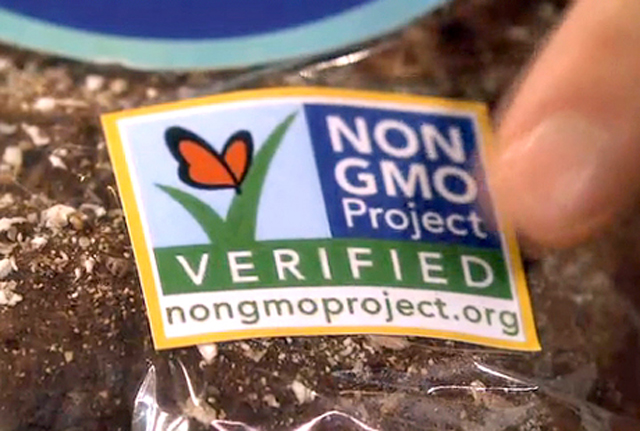
- Call For Labelling: Reach out to your local MP and demand to have GMO labelling of food products. As consumers we have a right to know what’s in our food.
- Buy Organic (or know your farmer’s practices): Choosing certified organic packaged foods is a good way to ensure you are not getting GMOs in the diet especially when you buy the foods outlined above or the foods that have their byproducts (yes, even everything with “sugar” on the label).
- Buy Whole, Unprocessed Foods: Buying whole, unprocessed foods is a sure fire way to know you are not consuming GMOs in the form of byproducts.
- Ask Questions At Restaurants: What kind of oil is used? might be a good place to start.
- Non-GMO Project: Look out for the Non-GMO project label when you go shopping and choose not to buy foods that contain GMOs. If we stop buying them, they’ll stop making them.
- Plant A Garden and Save Your Seeds: Start growing your own. Many communities now have seed days as well where you can trade seeds with others. No one should own the food supply and by having your own garden, you take a stand.
Where do I stand on the topic?
Label them. Label foods that contain genetically modified organisms so that consumers can make a choice as to whether they wish to consume them or not. Would I love to see them go away completely? You bet. Do I think they might be a contributing factor to bee colony collapse? Yes, I do. But I also recognize that Big Ag isn’t going away anytime soon. A movement to have mandatory GMO labelling will further increase awareness and invite consumers to make informed decisions and that is our right.
Resources
- The Detox Project
- Institute for Responsible Technology
- The Organic Center
- Moms Advocating Sustainability
- Food Politics
- Watch: Genetic Roulette
- Watch: The World According To Monsanto
- Watch: OMG GMO (family friendly!)
- Watch: Merchants of Doubt
Of course there can be arguments in every-which-way-direction the wind blows. I’ll leave you with one final question: If you are consuming genetically engineered foods, would you want to know?
Photo Credits
Corn: iStock/venturecx
Chemical spraying: iStock/asxsoonxas
Woman and children: iStock/Josef Muellek
Free Resource Library
Enjoy more than 40 downloadable guides, recipes, and resources.
















